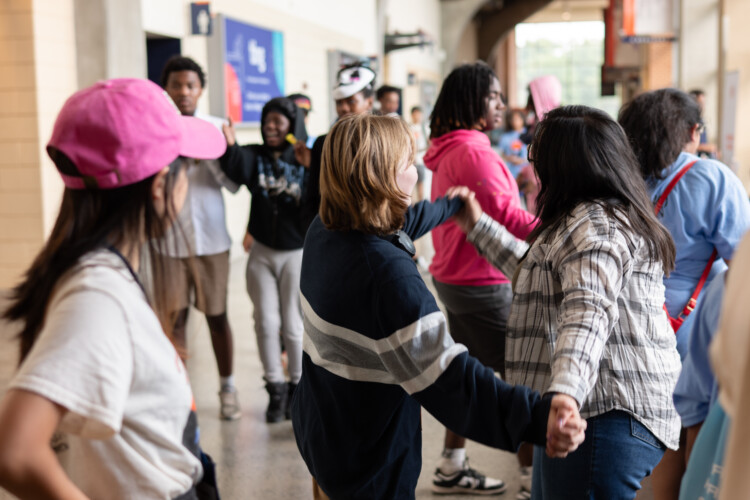Trustees of the William T. Grant Foundation, Spencer Foundation, Doris Duke Foundation, and Bezos Family Foundation have approved $2.6 million in funding for the winners of the 2024 Institutional Challenge Grant competition.
The winners of this year’s Institutional Challenge Grant are the University of Delaware, the University of Tennessee-Knoxville, Santa Clara University, and Washington University in St. Louis. These institutions will partner with local nonprofits or public agencies to:
- address inequalities in literacy opportunities and outcomes for K–3 students
- establish an implementation science program to better serve low-income and minoritized populations, focusing on Black and Latina pregnant teens
- support college preparation, persistence, and completion for Latinx students, and
- connect Black male youth with employment and enriched education opportunities.
The Institutional Challenge Grant encourages university-based research institutes, schools, and centers to grow existing research-practice partnerships with public agencies or nonprofit organizations in order to reduce inequality in youth outcomes. Each partnership receives a three-year award of $650,000.
“We are thrilled to receive so many high-quality applications,” said Adam Gamoran, president of the William T. Grant Foundation. “It’s a clear sign that researchers are recognizing the value of building research agendas in response to community priorities—and that universities are finding innovative ways to value and encourage community-engaged scholarship.”
“I look forward to using the presence of this grant to inform faculty across the campus about the importance of engaged scholarship and the importance it can hold in the annual review process as well as the promotion and tenure process”
As part of the program, grantee institutions must shift their policies and incentives to value collaborative work and strengthen institutional infrastructure to reward community-engaged research. At the University of Delaware, which will collaborate with the state’s Department of Education, the grant “will allow us to garner much more attention at the university for these kinds of initiatives and engaged scholarship,” said Gary Henry, Dean of the College of Education and Human Development and Professor in the School of Education and the Joseph R. Biden, Jr. School of Public Policy and Administration. “I look forward to using the presence of this grant to inform faculty across the campus about the importance of engaged scholarship and the importance it can hold in the annual review process as well as the promotion and tenure process.”
Mary McKay, Vice Provost for Interdisciplinary Initiatives at Washington University in St. Louis, who is partnering with Sean Joe, the Benjamin E. Youngdahl Professor of Social Development, and with the Boys and Girls Club of St. Louis, the Greater St. Louis Foundation, and the Fathers and Families Support Center, said that the collaboration is “a model for what we want to do as an institution, which is to create these vibrant, deep networks of partners that are in this with us in terms of our research and teaching. … We’re super excited to make this network a rich resource for other faculty doing related work around young people, their families, and the adults that raise them.”
Here what we’re doing is really bringing in the strength of both organizations … in order to create something better than what we could do individually
The partnerships also enhance the capacity of nonprofits or public agencies to use evidence in their decision-making. “Community health centers are typically tasked with providing access to care for under-resourced communities, and we recognize that part of that charge involves contributing to the scholarly literature [and] to the knowledge base about best practices to improve the health of a community. Here what we’re doing is really bringing in the strength of both organizations—UT with the research methodology and scientific rigor, and then our work in the trenches with under-resourced communities—in order to create something better than what we could do individually,” said Parinda Khatri, Chief Executive Officer at Cherokee Health Systems, which is partnering with the University of Tennessee-Knoxville.
For the Latino Education Advancement Foundation (LEAF), which, alongside the Foundation for Hispanic Education, is collaborating with Santa Clara University, “We want to do more of the systemic change work, knowing that these higher education systems need to change to serve this huge population of students who isn’t being served in our public education systems,” said Brittany Alvarez, LEAF’s Executive Director. The partnership “is going to deepen the areas of expertise that we have around collecting and utilizing research evidence for programmatic improvement, for best practice collection, and then sharing those best practices widely with all of the colleges and universities that we work with.”
All Institutional Challenge Grant recipients are eligible to apply for continuation funding of $350,000 to further their success in strengthening partners’ capacities to use research in their practice, enhancing institutional infrastructure to reward community-engaged research, and conducting rigorous research on reducing inequalities in youth outcomes.
Na’ilah Suad Nasir, president of the Spencer Foundation, said: “The Spencer Foundation invests in research that cultivates learning and transforms lives, and we believe that collaboration between scholars and policymakers, educators, communities, and families is key to driving equitable systems change. We are proud to support the Institutional Challenge Grant, designed to encourage such collaboration and improve the lives of young people.”
JooYeun Chang, program director for child well-being at the Doris Duke Foundation, stated: “We are thrilled to support these innovative partnerships through the Institutional Challenge Grant and to champion solutions that have the potential to reduce inequality in child and youth outcomes. These collaborations represent a vital step towards harnessing diverse expertise to effect sustainable, community-driven change.”
Jody Rosentswieg, director of strategic initiatives at the Bezos Family Foundation, said: “The Bezos Family Foundation is dedicated to ensuring frontline providers have access to research evidence they can use to improve the lives of young people. We are proud to support the Institutional Challenge Grant and these four grantees to elevate the value of research-practice partnerships across their institutions and partner with their communities to address inequality for young people.”






